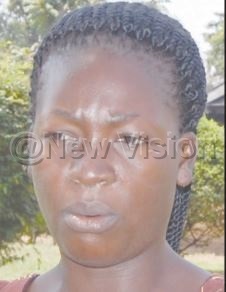2,372 Girls defiled, married off during COVID-19 lockdown
Aug 09, 2020
Domestic violence is common because men are not able to fully provide for their families. Girls are tormented and tired of seeing their mothers being battered. The girls opt to run into early marriage thinking it is a better option.

COVID-19|DOMESTIC VIOLANCE|CHILD MARRIAGE
Francis Awoko, a resident of Tenam A village in Mutunda sub-county, Kiryandongo district, could not believe that his daughter could be sneaked out of his house and defiled.
Unfortunately, it happened and July 13 will stay in his memory because it is the night he opened the door to the bedroom of his 15-year-old girl and found her missing.
In the dark of the night, with the COVID-19 curfew, Awoko checked all corners in the house, but the daughter was nowhere to be seen.
The Primary Six girl had been smuggled off for marriage by a broker, whose work was to connect young girls to men for money. The woman, who is now in Police custody, had taken the girl to a man's home. Police refused to name her for fear of jeopardising investigations.
For eight days, Awoko and his family searched for their daughter in vain.
VICTIM SPEAKS OUT
The girl (name withheld) said the broker started communicating with her on March 21, four months before they took her. It was a day after the closure of the schools. She gave her a phone for easy communication.
The broker told her there was a man who wanted to marry her, and after convincing the girls, she arranged for her escape at around 3:00am to a waiting getaway bodaboda. The girl was taken to a man in Katurikire. The man told her he was willing to pay bride price to formalise the marriage soon.
The two then proceeded to Bweyale, where they spent eight days waiting for transport to travel to Kampala. But on July 8, before they could travel, the Police stormed their hideout and found her. They arrested the female broker. However, the man escaped.
Asked if she had given up on her education, she said the man had promised to take her to a vocational school once the schools reopened.

EARLY MARRIAGES
Hussein Mwesige, the Kyegegwa district senior education officer, said since schools were closed in March, many girls have been defiled in the district.
"If we open schools today, at least 48 girls will not go back to school because they were married off. Others are pregnant," he said, noting that parents were not prepared for a prolonged holiday.
"Parents were used to spending lesstime with their children. They are now struggling to take care of them during this long period," he said.
The 48 girls he is talking about are among the 2,372 girls who have been impregnated in Kyegegwa, Kiryandongo, Kasese, Ngora, Lyantonde and Kasese districts during the lockdown.
Figures obtained from the department of health, probation and social welfare and education indicate that 128 school girls were married off, while Police recorded 110 defilement cases in this area.
The Rev. Stephen Kalyebala, the executive director of Development Foundation for Rural Area (DEFORA), said the most affected sub-countries are Mpala, Ruyonza, Kyegegwa and Kyegegwa town council, where they have registered the highest number of teenagers being married off by their parents.
FORGING BIRTH CERTIFICATES
Kalyebala said poverty is one of the key drivers of child marriages because parents want money and bride price.
"They even forge the children's birth certificates and hide their immunisation cards to conceal their right age. This makes it difficult for the Police and court to prosecute the culprits," Kalyebala said.
He also said the weak laws are one of the biggest challenges. Kalyebala cited an example where suspects cannot be held in a Police cell beyond 48 hours.
"That time is not enough for the Police officers to investigate offences. When the Police release the suspects on bond, they disappear, negotiate with parents or tamper with the evidence," he said.
The country has no systems in place of tracing people. A suspect can disappear, change the name and live in peace in the next district.
Benjamin Abisobora, the Nyamahasa parish chief in Mutunda sub-county, Kiryandongo district, blamed the child marriages on parents.
"Parents prefer settling defilement cases out of court because they fear losing out on pride price once the defiler is jailed," he said.

INVESTIGATED CASES
The regional Police spokesperson of Rwenzori west, Vincent Twesige, said they have investigated all the cases reported and the suspects are on remand. He said over 30 cases have been reported and where they have failed, he blamed it on parents who negotiate with the suspects.
Kalyebala also said there is a big challenge in Kyegegwa sub-county which has no health centre III, yet the victims of defilement need Pre-Exposure Prophylaxis (PrEP) to protect them from contracting HIV. He said young girls die giving birth because their bodies are not yet ready to handle child delivery stress, while others are suffering from fistula.
Macklin Nyamwiza, the woman councillor of Kasule sub-county, said the urban centres have been hit most because parents lack food.
"Domestic violence is common because men are not able to fully provide for their families. Girls are tormented and tired of seeing their mothers being battered. The girls opt to run into early marriage thinking it is a better option," she said.
SOLUTION
Abisobora said they are sensitising the communities and empowering girls with information so that they do not fall into the trap of defilers.
Joy for Children Uganda, a non-governmental organisation, is working with several communitybased organisations in Isingiro, Kiryandongo, Kamwenge, Arua and Kyegegwa, on how to end child marriages under the project of Accelerating Progress to End Child Marriage in Uganda.
Moses Ntenga, the executive director for Joy for Children Uganda, said with funds from Girls Not Brides, they have trained community champions, who act as change agents. They include religious, cultural, traditional and opinion leaders.
"Champions refer cases of child marriage and work within local structures to ensure those cases are reported and follow-up," he said.
Ntenga said the project is aimed at increasing government commitment to implement laws and policies at both national and sub-national levels on ending child marriage.
"At the national level, we are reminding legislators to advocate increased budgets for child protection departments. We are working through line ministries of gender and education to ensure that the Sexuality Education Framework is rolled out. We are also ensuring that the district action plans on ending child marriage are implemented," he said.
Grace Kisembo, the chief administrative officer of Kyegegwa district, urged parents to spend more time with children during the lockdown and also watch them carefully in order to avoid being taken advantage of by people who offer petty gifts and defile them.
Worrying numbers
Augustine Nyakabwa, the Kyegegwa district probation officer, said they have registered over 13 cases of aggravated defilement, including where fathers sexually abuse their children.
"Some girls have been abused by their fathers, but such files disappear from Police custody, making it hard for us to proceed to court," he said.
He said in 2019 alone, 5,000 girls below the age of 18 attended antenatal care services. "If such a number goes into child bearing with an average fertility rate of 7.8 per mother, the future is worrying," he said.
"You cannot have children with less knowledge on parenting, having babies. What kind of society are we bringing into the world?" he said.
